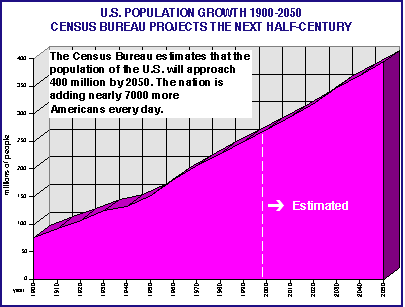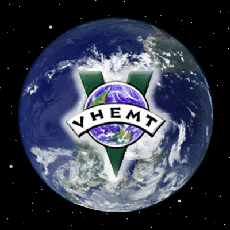I think that whole overpopulation thing is nonsense, a lot of people say this but I'd like to see some facts and links. The Earth could support far more people than it does now. Most Western countries are actually struggling with low birth rates and an ageing population and need people to have children.
I think that comment about big families is a bit offensive, everybody has the right to choose how many children they have, whether it be 0 or 50. Some people choose to have big families, it doesn't mean their extremist religious nutcases. There's a lot of different reasons why people might choose to have big families.
The earth can support more people than it does now. And it will--this is inevitable. People
will keep having babies. We have not yet reached the point where we crash the biosphere, but as long as the population keeps rising, that point is also inevitable.
You give the example of growth rates slowing in western nations--true story. The official U.S. census bureau estimates the growth rate will be slower than in previous years, and that the rate peaked in the 1950's.
Here's a chart. The growth rates are indeed slowing down--a bit. The growth itself I would say is quite substantial; wouldn't really categorize it as struggling.
You can verify the statistics on the official U.S. census bureau page.
Raw data:
http://www.census.gov/population/censusdata/table-4.pdf
Methodology and assumptions:
http://www.census.gov/population/projections/files/methodology/methodstatement12.pdf
That's a projected growth "from 314 million in 2012 to 420 million in 2060" (quoting the U.S. government site).
The overall trend in industrialized, 'advanced' nations is a slowing in growth rate, too. Again, that should not be interpreted as any sort of
decline in population--the reality is very much the opposite.
It's important to bear in mind that while industrialized nations are not skyrocketing in population nearly so quickly as most 'third-world nations', the amount of resources consumed is far, far greater per capita in industrialized nations. This is the concept of the ecological footprint.
Here's a link to a site about footprints:
Ecological footprint statistics - countries compared - Nation Master
The united states is #2, requiring an average of 12.22 hectares to sustain as opposed to say, Ethiopia with 0.85 hectares per person.
You can debate the exact number if you don't trust that website, but I think we can agree that someone with electricity, running water, a widely varied diet, ipod, etc is going to consume more resources than someone who eats pounded cassava every day and lives in a mud hut.
So basically, both an ever-larger number of people and an increasingly industrialized world are consuming resources at an ever-increasing rate. The planet only has so many hectares--it's a question of when we run out, not if.
Meanwhile, we're killing off most of the other species at an alarming rate. The given number is usually one species every 20 minutes, which is a mathematical construct based on a certain number of species per hectare of habitat lost. Even if that number is off a bit, the habitat loss isn't--it's easy enough to measure.
Here's some real-time stuff:
Statistics - WorldClock.com
I'm curious as to your source that says overpopulation is nonsense and not a real threat.


